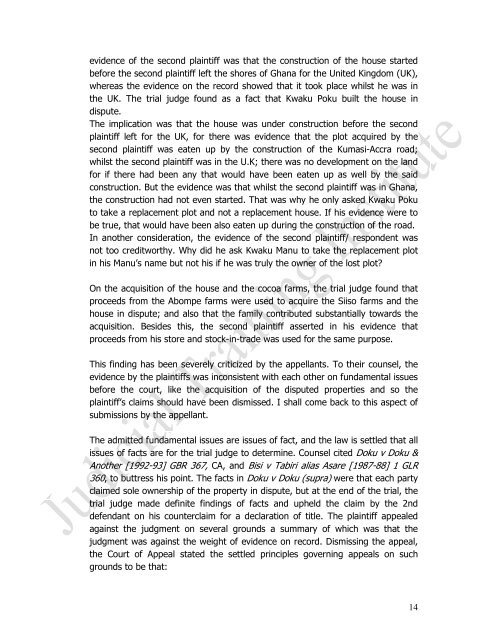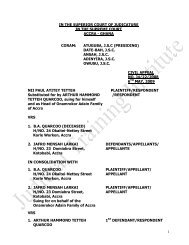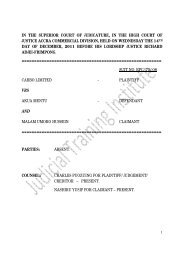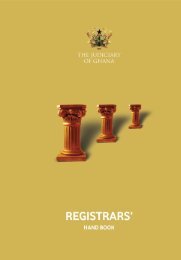AKOSUA DUFIE VRS.pdf - Judicial Training Institute
AKOSUA DUFIE VRS.pdf - Judicial Training Institute
AKOSUA DUFIE VRS.pdf - Judicial Training Institute
You also want an ePaper? Increase the reach of your titles
YUMPU automatically turns print PDFs into web optimized ePapers that Google loves.
evidence of the second plaintiff was that the construction of the house started<br />
before the second plaintiff left the shores of Ghana for the United Kingdom (UK),<br />
whereas the evidence on the record showed that it took place whilst he was in<br />
the UK. The trial judge found as a fact that Kwaku Poku built the house in<br />
dispute.<br />
The implication was that the house was under construction before the second<br />
plaintiff left for the UK, for there was evidence that the plot acquired by the<br />
second plaintiff was eaten up by the construction of the Kumasi-Accra road;<br />
whilst the second plaintiff was in the U.K; there was no development on the land<br />
for if there had been any that would have been eaten up as well by the said<br />
construction. But the evidence was that whilst the second plaintiff was in Ghana,<br />
the construction had not even started. That was why he only asked Kwaku Poku<br />
to take a replacement plot and not a replacement house. If his evidence were to<br />
be true, that would have been also eaten up during the construction of the road.<br />
In another consideration, the evidence of the second plaintiff/ respondent was<br />
not too creditworthy. Why did he ask Kwaku Manu to take the replacement plot<br />
in his Manu’s name but not his if he was truly the owner of the lost plot?<br />
On the acquisition of the house and the cocoa farms, the trial judge found that<br />
proceeds from the Abompe farms were used to acquire the Siiso farms and the<br />
house in dispute; and also that the family contributed substantially towards the<br />
acquisition. Besides this, the second plaintiff asserted in his evidence that<br />
proceeds from his store and stock-in-trade was used for the same purpose.<br />
This finding has been severely criticized by the appellants. To their counsel, the<br />
evidence by the plaintiffs was inconsistent with each other on fundamental issues<br />
before the court, like the acquisition of the disputed properties and so the<br />
plaintiff’s claims should have been dismissed. I shall come back to this aspect of<br />
submissions by the appellant.<br />
The admitted fundamental issues are issues of fact, and the law is settled that all<br />
issues of facts are for the trial judge to determine. Counsel cited Doku v Doku &<br />
Another [1992-93] GBR 367, CA, and Bisi v Tabiri alias Asare [1987-88] 1 GLR<br />
360, to buttress his point. The facts in Doku v Doku (supra) were that each party<br />
claimed sole ownership of the property in dispute, but at the end of the trial, the<br />
trial judge made definite findings of facts and upheld the claim by the 2nd<br />
defendant on his counterclaim for a declaration of title. The plaintiff appealed<br />
against the judgment on several grounds a summary of which was that the<br />
judgment was against the weight of evidence on record. Dismissing the appeal,<br />
the Court of Appeal stated the settled principles governing appeals on such<br />
grounds to be that:<br />
14





